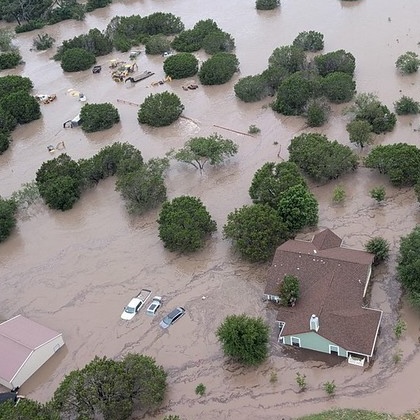Science
Climate Report Warns of Urgent Action Needed to Avert Crisis

A new report led by scientists from Oregon State University indicates that 2024 was the hottest year recorded in at least 125,000 years. The findings, published in the journal BioScience, highlight the urgent need for immediate and effective climate action to avoid catastrophic consequences for humanity and the planet.
Co-lead author William Ripple warns that without robust strategies, the world risks entering a phase of “climate-driven chaos.” The report identifies alarming trends, noting that 22 of the planet’s 34 vital signs are at record levels, including greenhouse gas concentrations and ocean acidity. Ripple emphasized that while the 2015 Paris Agreement aimed to limit temperature increases, it is still possible to mitigate damage even if this target is missed.
Despite the grim statistics, the report advocates for various high-impact strategies to combat climate change. Ripple asserts, “What’s urgently needed are effective climate mitigation and adaptation strategies, including ones that embed climate resilience into national defense and foreign policy frameworks.” He also calls for grassroots movements to push for a socially just transition away from fossil fuels, reducing the industry’s political and financial influence.
Key Findings and Recommendations
The report outlines several core areas where immediate action can make a substantial difference:
1. **Energy Transition**: Renewable energy sources like solar and wind could potentially supply up to 70% of global electricity by 2050. Phasing out fossil fuels is highlighted as one of the most significant contributions to climate mitigation.
2. **Ecosystem Restoration**: Protecting and restoring ecosystems such as forests and wetlands could remove or prevent around 10 gigatonnes of carbon dioxide emissions annually by 2050, which equates to approximately 25% of current yearly emissions.
3. **Food Systems**: Reducing food loss and waste, which currently accounts for 8-10% of global greenhouse gas emissions, alongside shifting towards more plant-rich diets, represents a viable pathway to lower emissions while enhancing human health and food security.
Co-lead author Christopher Wolf, now with Terrestrial Ecosystems Research Associates, points out that humanity is currently in a state of ecological overshoot. The report notes that population growth, livestock numbers, and meat consumption are reaching all-time highs. It advocates for transformative changes across various societal sectors, particularly in reducing overconsumption by wealthier populations.
Among the report’s additional alarming indicators, fossil fuel energy consumption reached a new high in 2024. While solar and wind energy also set records, their combined usage remains significantly lower—31 times less than fossil fuels. The report also highlights accelerating warming trends, driven by factors such as reduced aerosol cooling and declines in albedo, which refers to the Earth’s reflectivity.
Impacts of Climate Change
The report provides a stark overview of the human and environmental toll of climate change. In 2024 and 2025, weather-related disasters surged in frequency and severity. Notable incidents include flooding in Texas, resulting in at least 135 fatalities, and California wildfires causing damages exceeding $250 billion. Typhoon Yagi in Southeast Asia claimed the lives of over 800 people.
The weakening of the Atlantic Meridional Ocean Overturning Circulation poses further threats, indicating potential for significant climate disruptions. The authors stress that every fraction of a degree of avoided warming is crucial for the well-being of both humans and ecosystems. They argue that delaying action will only incur higher costs and more severe consequences, while coordinated and swift measures could yield immediate benefits.
Ripple concludes, “Climate mitigation strategies are available, cost-effective, and urgently needed. We can still limit warming if we act boldly and quickly, but the window is closing.” The report underscores that the economic costs of failing to address climate change are likely far greater than the costs associated with implementing effective mitigation strategies.
As the urgency of the climate crisis escalates, the report serves as a clarion call for global leaders, policymakers, and individuals alike to take decisive action. The future of the planet and its inhabitants depends on the choices made today.
-

 Business2 weeks ago
Business2 weeks agoIconic Sand Dollar Social Club Listed for $3 Million in Folly Beach
-

 Politics2 weeks ago
Politics2 weeks agoAfghan Refugee Detained by ICE After Asylum Hearing in New York
-

 Health2 weeks ago
Health2 weeks agoPeptilogics Secures $78 Million to Combat Prosthetic Joint Infections
-

 Science2 weeks ago
Science2 weeks agoResearchers Achieve Fastest Genome Sequencing in Under Four Hours
-

 Lifestyle2 weeks ago
Lifestyle2 weeks agoJump for Good: San Clemente Pier Fundraiser Allows Legal Leaps
-

 Health2 weeks ago
Health2 weeks agoResearcher Uncovers Zika Virus Pathway to Placenta Using Nanotubes
-

 World2 weeks ago
World2 weeks agoUS Passport Ranks Drop Out of Top 10 for First Time Ever
-

 Business2 weeks ago
Business2 weeks agoSan Jose High-Rise Faces Foreclosure Over $182.5 Million Loan
-

 Science2 weeks ago
Science2 weeks agoMars Observed: Detailed Imaging Reveals Dust Avalanche Dynamics
-

 Entertainment2 weeks ago
Entertainment2 weeks agoJennifer Lopez Addresses A-Rod Split in Candid Interview
-

 World2 weeks ago
World2 weeks agoRegional Pilots’ Salaries Surge to Six Figures in 2025
-

 World2 weeks ago
World2 weeks agoObama Foundation Highlights Challenges in Hungary and Poland









